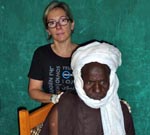Maria Mercè traveled this spring to Mali to participate in the second medical-surgical commission of the Foundation’s project in the African country, which has taken place in the Reference Hospital in Bankass, equipped with a complete surgical unit funded by Eyes of the world. A doctor, she is a volunteer that is very involved with people that are suffering from visual deficiencies in the poorest territories of the world, which has led her to travel on different occasions to the Sahrawi camps with her partner, the ophthalmologist and medical supervisor of the Eyes of the Sahara programme until 2009, Josep Maria Rafart, who has also traveled to Mali.
How was your last experience with Eyes of the world?
It was very good. While we were in Mali we worked a lot and we returned vision to a lot of people. After trips like these, I always return tired, because of the difficult working conditions, the heat and the language difficulties, but satisfied with a job well done and with gratitude that we received from patients whose eyes we opened.
What do you think of the medical commission in Mali?
I think it is excellent. The atmosphere among the participants of the group was very good; I think it is fundamental that the participants understand the project in order for everything to function properly. Our group functioned very well together, and we did a lot and did it well. The ophthalmological unit that is set up in Bankass is very good, keeping in mind the situation of the hospital: the physical space where it is located is correct, the fittings of the office and the operating room are acceptable and the ophthalmological equipment is also correct.
What was the job carried out by the local professionals during the commission? Did you find a good predisposition on their part?
The job of the local professionals is collaboration and learning. The predisposition that they had was very good. At first, they expect to see how we work, but after seeing how we work and talking to the ophthalmologist who headed the commission, the fears disappeared and everyone did their job. I was always working in the office and I got along very well with both the ophthalmology technicians and with the staff helping in the office, since they collaborated with everything they could and with motivation to learn.
Describe Mali and its people in a few words
Mali is a very big country and I cannot describe it, I can only talk about Bankass and Dogon Country. Bankass is a small town located in the south of Mali. The infrastructure is minimal and the hospital is made up of different wards, with little equipment and a lot of dirt. The Dogon Country is made up of villages that live above or below the “falaise of Bandiagara,” they have a very picturesque shape and the houses are made of mud or stone and logs. Their economy is subsistent and their society is based on the family, with traditions and belief being an important part of their daily life. They respect all religions and can live together without too many problems. Overall, I found the people happy and hard-working.
Mali has lately been at the forefront of public opinion, although authorities confirm that the Mopti region is safe. Did you see it like that?
I did not observe any risky situations around us. The Mopti area seemed safe and both in Mopti and in the Dogon Country there are tourists who walk around with total tranquility. I had no sense of danger during our stay in Mali.
What differences have you found between Mali and other programmes?
I have found many differences in the way of being of the people. I have been in the Sahara and the Sahrawi’s are more westernized, they are more accustomed to Spaniards. In regards to work, in every place there are many things to do and if you are lucky you find a good team (which I have always found) a lot of work is done and by the end of the trip you are tired and satisfied. As for the purpose of the programme, I do not see a difference. In every place we try to solve ophthalmological problems and teach, train and collaborate with local staff.
On a personal level, what does being a volunteer with an organization like Eyes of the world bring to you?
Being a volunteer and aid worker always brings you knowledge and wisdom. First of all, you have the opportunity to meet new people, from the group that you get to go with and from the country where you are going to work. Meeting different people always brings new visions and ways of seeing and living life. I also like to get to know a new social reality, a different way of living, a religion, values, traditions, different customs, and above all, different necessities. This brings me the knowledge of giving importance to the things that matter and of putting into perspective many things and situations that are not so.
